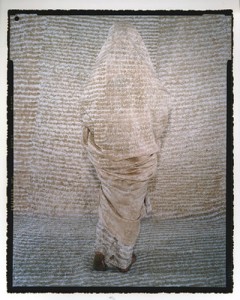News

I was asked to guest-edit an issue of the Nigerian magazine Farafina, and I am thrilled to report that some of the contents are now online: fiction by Hisham Matar, poetry by Mathew Shenoda, essays by Anouar Majid, Wail S. Hassan, and Karim Kettani, criticism by Nouri Gana, artwork by Lalla Essaydi, and photography by Hoda Mana, Simona Schneider, and Alex Yera.
Subscribers should be getting their copies in a couple of weeks. If you don’t subscribe yet, you can go here.
I am running around this morning trying to finish a few things before heading out to USC to give a talk. Here are the details, in case you’re in the area:
Monday, October 20, 2008
12:30pm to 2:00pm
University Park Campus
Social Sciences Building B-40
Free
See you there!
Last fall, at the Ferrara festival of literature, I was lazily waiting for my turn at the coffee shop when I noticed a bunch of policemen sweep through the lobby and enter the auditorium where the authors present their books. The Carabinieri were there to protect Roberto Saviano, the journalist who has exposed the workings of the Camora (the Neapolitan mafia) in his book Gomorrah. He has been under police protection for two years already but now the Camora goons have announced that they want him dead by Christmas. Saviano says he wants to flee Italy.
A 38-year-old man from Iowa is facing a 20-year prison sentence for allegedly possessing Japanese comic books that the government deems “obscene,” because they supposedly depict teens engaging in sexual acts. No photographic images were found in his possession–only comic drawings published in Japan, a small portion of which involved depictions of sex acts.
The Comic Book Legal Defense Fund, which usually helps cartoonists with legal matters, is taking a special interest in the case; it is the first time a private collector is being prosecuted:
Handley’s case began in May 2006 when he received an express mail package from Japan that contained seven Japanese comic books. That package was intercepted by the Postal Inspector, who applied for a search warrant after determining that the package contained cartoon images of objectionable content. Unaware that his materials were searched, Handley drove away from the post office and was followed by various law enforcement officers, who pulled him over and followed him to his home. Once there, agents from the Postal Inspector’s office, Immigration and Customs Enforcement Agency, Special Agents from the Iowa Division of Criminal Investigation, and officers from the Glenwood Police Department seized Handley’s collection of over 1,200 manga books or publications; and hundreds of DVDs, VHS tapes, laser disks; seven computers, and other documents. Though Handley’s collection was comprised of hundreds of comics covering a wide spectrum of manga, the government is prosecuting images appearing in a small handful.
You can read about the case here. The thing I find strange about it is the fact that drawings, which are products of the imagination, just like novels, can be considered obscene and subject to child pornography laws. And where does one stop? Would Utamaro’s woodblock print Lovers in an Upstairs Room, which has been exhibited in museums around the world, fall under this same category?
(via Neil Gaiman’s blog)
A Czech institute has published a police report claiming that Milan Kundera denounced a spy named Miroslav Dvoracek to the Communist police in 1950. Kundera vehemently denies the charge.
Dvoracek, the story goes, had left Czekoslovakia in 1948, and was living in Germany when he was recruited by the US to spy for them. He was sent back to his country. While on a visit to Prague, he left a suitcase in a friend’s dorm room; the friend told her boyfriend; the boyfriend told Kundera; and Kundera allegedly whent to the police. Dvoracek was arrested and later sentenced to 22 years in prison. The AFP reports:
Kundera denied he ever reported on Dvoracek’s whereabouts.
“I didn’t know the man at all,” he told the CTK news agency.
Kundera, who has refused to speak to the press for years, said the institute and the media had committed “an attack on an author,” adding that the police document discovered by the historians was a mystery to him.
He said “my memory has not tricked me, I did not work for the secret police.”
Dvoracek is now 80 years old and lives in Sweden. Who knows what really happened? A document is such an easy thing to produce. The truth is a little harder to ascertain.
